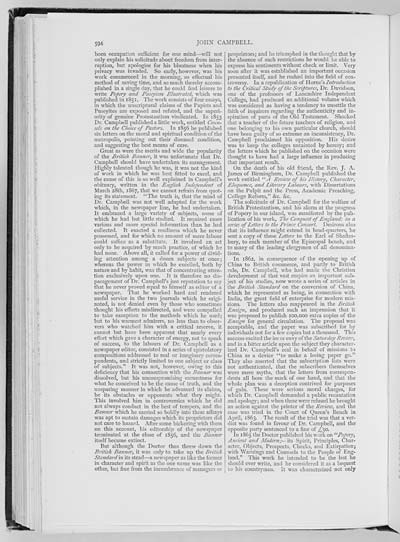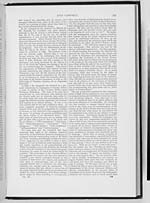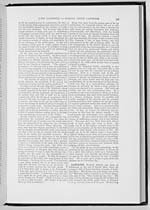Volume 3 > Half-Volume 6
(240) Page 594
Download files
Individual page:
Thumbnail gallery: Grid view | List view

594 been occupation sufficient for one mind�will not only explain his solicitude about freedom from inter- ruption, but apologize for his bluntness when his privacy was invaded. So early, however, was his work commenced in the morning, so effectual his method of saving time, and so much thereby accom- plished in a single day, that he could find leisure to write Popery and Puseyism Illustrated, which was published in 1851. The work consists of four essays, in which the unscriptural claims of the Papists and Puseyites are exposed and refuted, and the superi- ority of genuine Protestantism vindicated. In 1853 Dr. Campbell published a little work, entitled Coun- sels on the Choice of Pastors. In 1856 he published six letters on the moral and spiritual condition of the metropolis, pointing out their diseased condition, and suggesting the best means of cure. Great as were the merits and wide the popularity of the British Banner, it was unfortunate that Dr. Campbell should have undertaken its management. Highly talented though he was, it was not the kind of work in which he was best fitted to excel, and the cause of this is so well explained in Campbell's obituary, written in the English Independent of March 28th, 1867, that we cannot refrain from quot- ing its statement. "The truth is, that the mind of Dr. Campbell was not well adapted for the work which, in the newspaper line, he had undertaken. It embraced a large variety of subjects, some of which he had but little studied. It required more various and more special information than he had collected. It exacted a readiness which he never possessed, and for which no amount of mere labour could suffice as a substitute. It involved an art only to be acquired by much practice, of which he had none. Above all, it called for a power of divid- ing attention among a dozen subjects at once; whereas the power in which he excelled, both by nature and by habit, was that of concentrating atten- tion exclusively upon one. It is therefore no dis- paragement of Dr. Campbell's just reputation to say that he never proved equal to himself as editor of a newspaper. That he worked hard and rendered useful service in the two journals which he origi- nated, is not denied even by those who sometimes thought his efforts misdirected, and were compelled to take exception to the methods which he used; but to his warmest admirers, no less than to obser- vers who watched him with a critical reserve, it cannot but have been apparent that nearly every effort which gave a character of energy, not to speak of success, to the labours of Dr. Campbell as a newspaper editor, consisted in a series of epistolatory compositions addressed to real or imaginary corres- pondents, and strictly limited to one subject or class of subjects." It was not, however, owing to this deficiency that his connection with the Banner was dissolved, but his uncompromising earnestness for what he conceived to be the cause of truth, and the unsparing manner in which he advanced its claims, be its obstacles or opponents what they might. This involved him in controversies which he did not always conduct in the best of tempers, and the Banner which he carried so boldly into these affrays was apt to sustain damages which its proprietors did not care to hazard. After some bickering with them on this account, his editorship of the newspaper terminated at the dose of 1856, and the Banner itself became extinct. But although the Doctor thus threw down the British Banner, it was only to take up the British Standard'in its stead�a newspaper as like the former in character and spirit as the one name was like the other, but free from the incumbrance of managers or proprietors; and he triumphed in the thought that by the absence of such restrictions he would be able to express his sentiments without check or limit. Very soon after it was established an important occasion presented itself, and he rushed into the field of con- troversy. In a republication of Home's Introduction to the Critical Study of the Scriptures, Dr. Davidson, one of the professors of Lancashire Independent College, had produced an additional volume which was considered as having a tendency to unsettle the faith of inquirers regarding the authenticity and in- spiration of parts of the Old Testament. Shocked that a teacher of the future teachers of religion, and one belonging to his own particular church, should have been guilty of so extreme an inconsistency, Dr. Campbell proclaimed his opposition. His desire was to keep the colleges untainted by heresy; and the letters which he published on the occasion were thought to have had a large influence in producing that important result. On the death of his old friend, the Rev. J. A. James of Birmingham, Dr. Campbell published the work entitled "A Review of his History, Character, Eloquence, and Literary Labours, with Dissertations on the Pulpit and the Press, Academic Preaching, College Reform," &c. &c. The solicitude of Dr. Campbell for the welfare of British Protestantism, and his alarm at the progress of Popery in our island, was manifested by the pub- lication of his work, The Conquest of England: in a series of Letters to the Prince Consort. Desirous also that its influence might extend in head-quarters, he sent a copy of these Letters to the Earl of aShaftes- bury, to each member of the Episcopal bench, and to many of the leading clergymen of all denomina- tions. In 1862, in consequence of the opening up of China to British commerce, and partly to British rule, Dr. Campbell, who had made the Christian development of that vast empire an important sub- ject of his studies, now wrote a series of articles in the British Standard on the conversion of China, which he represented as being, in connection with India, the great field of enterprise for modern mis- sions. The letters also reappeared in the British Ensign, and produced such an impression that it was proposed to publish 100,000 extra copies of the Ensign for general circulation. The proposal was acceptable, and the paper was subscribed for by individuals not for a few copies but a thousand. This success excited the ire or envy of the Saturday Review, and in a bitter article upon the subject they character- ized Dr. Campbell's zeal in behalf of missions to China as a device "to make a losing paper go." They also asserted that the subscription lists were not authenticated, that the subscribers themselves were mere myths, that the letters from correspon- dents all bore the mark of one hand, and that the whole plan was a deception contrived for purposes of gain. These were serious moral charges, for which Dr. Campbell demanded a public recantation and apology; and when these were refused he brought an action against the printer of the Review, and the case was tried in the Court of Queen's Bench in April, 1863. The result of the trial was that a ver- dict was found in favour of Dr. Campbell, and the opposite party sentenced to a fine of �50. In 1865 the Doctor published his work on "Popery, Ancient and Modern;�its Spirit, Principles, Char- acter, Objects, Prospects, Checks, and Extirpation; with Warnings and Counsels to the People of Eng- land." This work he intended to be the last he should ever write, and he considered it as a bequest to his countrymen. It was characterized not only
Set display mode to:
![]() Universal Viewer |
Universal Viewer | ![]() Mirador |
Large image | Transcription
Mirador |
Large image | Transcription
Images and transcriptions on this page, including medium image downloads, may be used under the Creative Commons Attribution 4.0 International Licence unless otherwise stated. ![]()
| Biographical dictionary of eminent Scotsmen > Volume 3 > Half-Volume 6 > (240) Page 594 |
|---|
| Permanent URL | https://digital.nls.uk/74514754 |
|---|---|
| Attribution and copyright: |
|
| Description | Volume III. Contains names alphabetically from Macadam to Young. |
|---|

